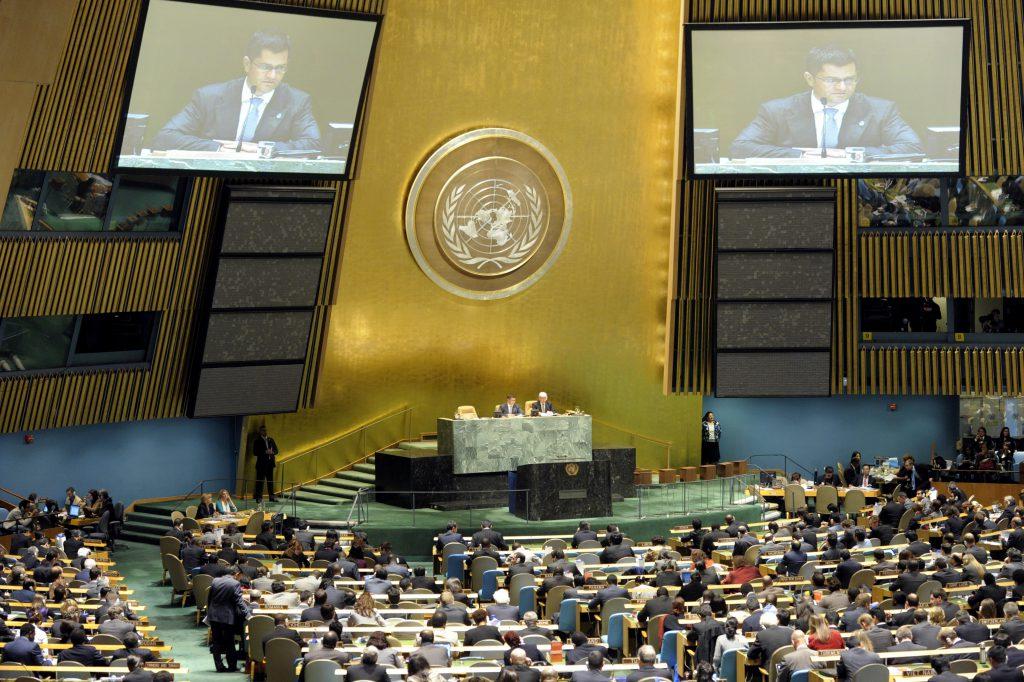Elections at the UN: Australia’s approach
Posted By Sally Richardson on October 13, 2017 @ 06:00

Australia is poised to be elected to the United Nations Human Rights Council (HRC) when the General Assembly meets on 16 October. Until recently, Australia, Spain and France were locked in a tight contest for two of the three available seats. However, in a demonstration of how hard these races can be, France announced [1] in July 2017 that it would postpone its candidacy to the next term (2021–2023). It’s now almost a fait accompli that Australia and Spain will be elected by the UN membership. It’s a significant role—we’ll have the opportunity to make a valuable contribution to the work of the pre-eminent intergovernmental body overseeing the protection and promotion of global human rights. In doing so, we can promote our own interests and build influence as a global player.
Our HRC candidacy presents a timely opportunity to consider the value of serving on UN intergovernmental bodies and Australia’s rationale for and approach in regularly putting itself forward as a candidate. My paper [2], released today by ASPI, does just that. It also offers the following recommendations for the Australian government to strengthen Australia’s engagement in UN electoral processes:
- maintain Australia’s extensive electoral representation as part of a strategic plan for engagement at the UN
- engage in greater public outreach to the Australian community, to strengthen the implementation of the government’s public diplomacy strategy [3] and to increase awareness about the importance of Australia’s UN engagement, including its pursuit of UN candidacies
- engage more strategically with Australians working in the UN and related organisations to identify potential candidates for UN elections
- explore possibilities for strengthening Australia’s relationship with non-traditional partners. That will facilitate Australia’s future campaigns for UN bodies and is consistent with Australia acting as a sustainable global player.
The paper draws on my experience as elections officer for the Australian government at its Permanent Mission to the UN in New York. I represented Australia in the numerous elections held at UN headquarters, including those that involved an Australian candidacy. I had the honour of promoting the successful candidacies of two Australians: Professor Ron McCallum for election to the Committee on the Rights of Persons with Disabilities and Professor Megan Davis for election to the Permanent Forum on Indigenous Issues. Both made major contributions as experts to those UN bodies. My paper suggests that the impressive work of Australians at the UN should be better promoted domestically, not just to advertise that opportunities exist for qualified Australians to serve in the UN, but to show that Australians’ expertise is recognised internationally.
My main job was working on Australia’s successful candidacy to the Security Council for the 2013–2014 term. Australia was seeking one of the two available non-permanent seats, in an intense contest with Luxembourg and Finland. Our competitors had a head start of seven and six years respectively before Australia entered the race in 2008. The vote, of all 193 member states of the UN General Assembly, was on 18 October 2012. I recall approaching the GA Hall with the Australian ambassador, Gary Quinlan. As the Australian delegation entered the iconic building, some friendly faces immediately approached us—some longstanding allies, and some more recent but equally genuine friends born out of Australia’s extensive outreach in its campaign. There were others who were interested observers of the intense contest. And some who were clearly hopeful that our European competitors would be successful.
What I most remember is the importance of the day for Australia. The vote marked a culmination of years of intensive global effort by many Australians and our candidacy represented a desire to contribute to the rules-based global order and to shape outcomes from the pre-eminent body responsible for maintaining international peace and security. Election would also be meaningful for Australia’s international standing and influence. A defeat would have been crushing. But the inevitability of contests in Security Council elections meant that Australia had to put itself on the line if it wished to serve.
Of course it’s not just about the campaign—the contribution afterwards is critical. Throughout the UN’s 72-year history, Australia has been an influential and engaged actor. Due to our geographic location, size and approach to diplomacy, we’ve often been able to navigate fractious issues. That was demonstrated during our Security Council term, when Australia took the lead with Luxembourg and Jordan on initiatives to address the Syrian humanitarian crisis—something rarely done by a non-permanent member of the council. Australia also led the council’s response to the downing of Malaysia Airlines flight MH17, in which 298 people were killed, including 38 Australians. Australia’s seat at the council table gave us leverage to negotiate directly with council members, especially Russia. Australia obtained the resolution supporting an impartial international investigation and demanding accountability for the perpetrators. It was an important global response.
Australia’s election to the HRC will be historic for Australian foreign policy. Australia will no doubt look to build on its UN reputation to make a strong contribution to the work of the HRC. Our interest in serving can also be viewed as an effort to maintain our momentum at the UN and sustain our influence.
Article printed from The Strategist: https://aspistrategist.ru
URL to article: /elections-at-the-un-australias-approach/
URLs in this post:
[1] announced: http://www.diplomatie.gouv.fr/en/french-foreign-policy/human-rights/events/article/human-rights-france-s-support-for-the-spanish-candidate-to-the-human-rights
[2] paper: https://www.aspistrategist.ru/report/elections-un-australias-approach
[3] public diplomacy strategy: http://dfat.gov.au/people-to-people/public-diplomacy/pages/public-diplomacy-strategy.aspx
Click here to print.